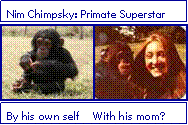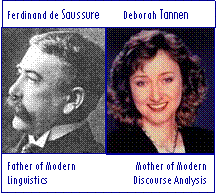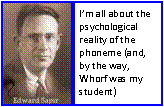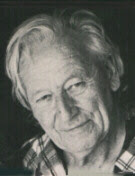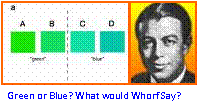Rachel Tolentino- college_girl8509@tamu.edu
email Rachel if you want to study with her group (being assembled) and you can work out a time
also email me if you want to be a facilitator and have your email put up here for others to contact you
Wednesday, February 25, 2009
Friday, February 13, 2009
QuiXam 2 Next Friday, 2/20
You will need to know
1) everything we studied for QuiXam 1.
2) human biological adaptations for speech/language
3) vocal tract anatomy
4) everything about orthography including
problems with phonics, orthographies, deep and shallow orthographies
5) places and manner of articulation for English consonants
MEMORIZE the CONSONANT CHART!!
I will give you scrap paper, so the first thing you'll do when you start the test is write it out from memory. This will enable you to answer all sorts of questions about consonants and their feature bundles-voicedness, place of articulation, and manner of articulation
1) everything we studied for QuiXam 1.
2) human biological adaptations for speech/language
3) vocal tract anatomy
4) everything about orthography including
problems with phonics, orthographies, deep and shallow orthographies
5) places and manner of articulation for English consonants
MEMORIZE the CONSONANT CHART!!
I will give you scrap paper, so the first thing you'll do when you start the test is write it out from memory. This will enable you to answer all sorts of questions about consonants and their feature bundles-voicedness, place of articulation, and manner of articulation
Thursday, February 5, 2009
A small extra credit op
for me to know who i'm e-mailing in the moment and learn your names faster- i'll add one point to your quiXam if you start including your digital pic with your email (as an attachment). i'll do it again for the next exam if you continue the practice. 
Wednesday, February 4, 2009
Friday's Exam
There's a nice list of study questions on p. 26 in the second installment of chaplets, Adaptations & Orthography.
Here is a pithier set:
Know the difference between prescriptive and descriptive and that your grandmother has perfect grammar.
What passed for linguistics before modern linguistics? What/who was privileged? What was the goal of that approach to language study? What was ironic about New Testament Greek?
Saussure, descriptive/prescriptive, semiotics, synchronic/diachronic, syntagmatic/paradigmatic, langue and parole
Genie-critical window of first language acquisition
Science and Ideology
Chomsky: the LAD, the UG, competence vs performance, relationship between human language and other primates we know of
form and function, formal linguistics vs functional linguistics
animal communication systems,what they can't do that humans can
design features-we actually went over most of these in class when we talked about animal communication systems, so we'll go ahead and cover them
I'm going to add to this so check back in.
Here is a pithier set:
Know the difference between prescriptive and descriptive and that your grandmother has perfect grammar.
What passed for linguistics before modern linguistics? What/who was privileged? What was the goal of that approach to language study? What was ironic about New Testament Greek?
Saussure, descriptive/prescriptive, semiotics, synchronic/diachronic, syntagmatic/paradigmatic, langue and parole
Genie-critical window of first language acquisition
Science and Ideology
Chomsky: the LAD, the UG, competence vs performance, relationship between human language and other primates we know of
form and function, formal linguistics vs functional linguistics
animal communication systems,what they can't do that humans can
design features-we actually went over most of these in class when we talked about animal communication systems, so we'll go ahead and cover them
I'm going to add to this so check back in.
Subscribe to:
Posts (Atom)



